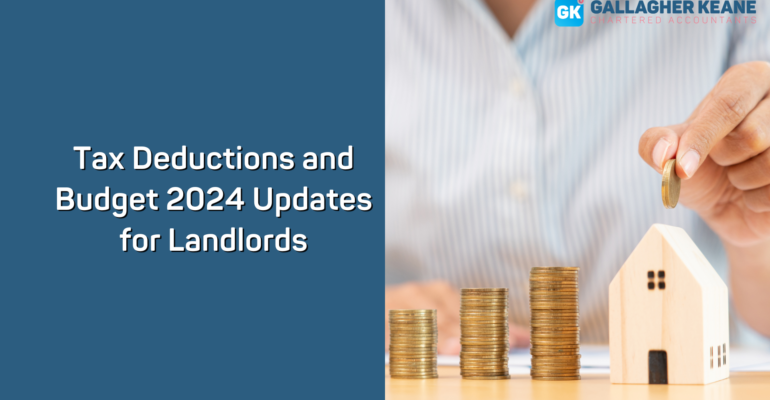Tax Deductions and Budget 2024 Updates for Landlords

As a landlord in Ireland, it’s mandatory to declare all rental income to the Revenue Commissioners. If you’re wondering about your rental income tax liability, please take a look at this guide to find out more about how to calculate, file, and reduce your tax payments as a landlord:
Rental Income Tax Calculation:
The tax you owe on rental income is determined by various factors, including your profits for the tax year, allowable expenses, personal circumstances (e.g., marital status, tax rate band), and any additional sources of income. Generally, rental income is subject to taxation at either the standard rate of 20% or the higher rate of 40%. Additionally, you may be liable to pay Universal Social Charge (USC) ranging from 0.5% to 8%, depending on additional earnings. Irish Tax Residents must also pay 4% PRSI on rental income profit.
In some cases, you may need to make preliminary tax payments based on your estimated tax liability for the current year. However, if it’s your first year as a landlord, preliminary tax is not mandatory.
Eligible Expenses for Rental Income: A Tax-saving Opportunity
As a landlord, understanding the allowable expenses can significantly reduce your tax liability. You will only be taxed on the profits earned from rental income after accounting for these expenses. Common expenditures that can be claimed against your rental income to lower your tax bill include:
- Maintenance costs (e.g., painting, cleaning)
- Insurance premiums
- Essential repairs
- RTB registration fees
- Management, legal, or accountancy fees
- Advertising expenses
- Mortgage Interest
Additionally, you can avail of capital allowances (wear & tear) on furniture and white goods purchased for your property. This allows for a 12.5% deduction of the cost per year, up to a maximum of eight years.
Many landlords may also qualify for relief on mortgage interest paid during the year. This involves deducting the interest on the mortgage used for property purchase, improvement, or repairs when calculating rental income for tax purposes. Note that registration with the RTB is a prerequisite for this relief.
A crucial reminder: It’s important to keep all receipts, work orders, bills, and official correspondences in order to support your claims.
Relief on Mortgage Interest:
You can deduct the interest on mortgages used to purchase, improve or repair rented residential property when working out your rental income for tax purposes.
You must show that you have registered all tenancies in the property with the Residential Tenancies Board (RTB). Interest can only be deducted during the period in which the property is let.
The amount of interest you can deduct on these mortgages has increased in recent years:
- Before 2017, it was 75% of the interest
- In 2017, it was 80% of the interest
- In 2018, it was 85% of the interest
- From January 2019, it is 100% of the interest
Budget 2024:
A temporary rental income tax relief is being introduced to support private landlords. The relief will be available against some rental income at the standard rate of 20% each year. It will be available from 2024 to 2027 and will only apply if the landlord keeps their rental property in the rental market for the next 4 years. Landlords can get 20% off:
- €3,000 for 2024
- €4,000 for 2025
- €5,000 for 2026 and 2027
The relief will reduce the tax due on rental income by up to €600 in 2024, €800 in 2025, and €1,000 in 2026 and 2027. The relief will be clawed back if the landlord leaves the rental market during this time.
How to Declare Your Rental Income:
For landlords earning income from rented properties in Ireland, an accurate declaration of the Revenue is crucial. The method you’ll follow depends on your net income:
- Net Income Above €5,000:
- You need to register with the Revenue Commissioners for self-assessment and file Form 11 to declare your earnings.
- Net Income €5,000 or Below:
-
- Declare your earnings in the non-PAYE section of the Revenue Commissioner’s online portal.
When is my rental Income Tax Return due?
Landlords must submit their tax returns and fulfil any necessary payments by October 31st of each year.


